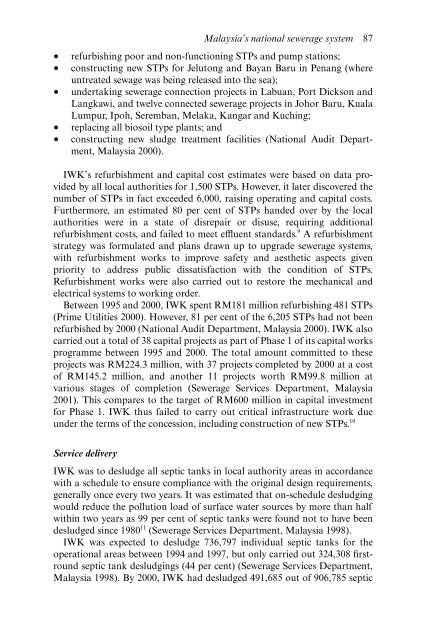PRIVATIZATION Privatization in Malaysia, Regulation, rent-seeking and policy failure
PRIVATIZATION Privatization in Malaysia, Regulation, rent-seeking and policy failure
PRIVATIZATION Privatization in Malaysia, Regulation, rent-seeking and policy failure
You also want an ePaper? Increase the reach of your titles
YUMPU automatically turns print PDFs into web optimized ePapers that Google loves.
<strong>Malaysia</strong>’s national sewerage system 87• refurbish<strong>in</strong>g poor <strong>and</strong> non-function<strong>in</strong>g STPs <strong>and</strong> pump stations;• construct<strong>in</strong>g new STPs for Jelutong <strong>and</strong> Bayan Baru <strong>in</strong> Penang (whereuntreated sewage was be<strong>in</strong>g released <strong>in</strong>to the sea);• undertak<strong>in</strong>g sewerage connection projects <strong>in</strong> Labuan, Port Dickson <strong>and</strong>Langkawi, <strong>and</strong> twelve connected sewerage projects <strong>in</strong> Johor Baru, KualaLumpur, Ipoh, Seremban, Melaka, Kangar <strong>and</strong> Kuch<strong>in</strong>g;• replac<strong>in</strong>g all biosoil type plants; <strong>and</strong>• construct<strong>in</strong>g new sludge treatment facilities (National Audit Department,<strong>Malaysia</strong> 2000).IWK’s refurbishment <strong>and</strong> capital cost estimates were based on data providedby all local authorities for 1,500 STPs. However, it later discovered thenumber of STPs <strong>in</strong> fact exceeded 6,000, rais<strong>in</strong>g operat<strong>in</strong>g <strong>and</strong> capital costs.Furthermore, an estimated 80 per cent of STPs h<strong>and</strong>ed over by the localauthorities were <strong>in</strong> a state of disrepair or disuse, requir<strong>in</strong>g additionalrefurbishment costs, <strong>and</strong> failed to meet effluent st<strong>and</strong>ards. 9 A refurbishmentstrategy was formulated <strong>and</strong> plans drawn up to upgrade sewerage systems,with refurbishment works to improve safety <strong>and</strong> aesthetic aspects givenpriority to address public dissatisfaction with the condition of STPs.Refurbishment works were also carried out to restore the mechanical <strong>and</strong>electrical systems to work<strong>in</strong>g order.Between 1995 <strong>and</strong> 2000, IWK spent RM181 million refurbish<strong>in</strong>g 481 STPs(Prime Utilities 2000). However, 81 per cent of the 6,205 STPs had not beenrefurbished by 2000 (National Audit Department, <strong>Malaysia</strong> 2000). IWK alsocarried out a total of 38 capital projects as part of Phase 1 of its capital worksprogramme between 1995 <strong>and</strong> 2000. The total amount committed to theseprojects was RM224.3 million, with 37 projects completed by 2000 at a costof RM145.2 million, <strong>and</strong> another 11 projects worth RM99.8 million atvarious stages of completion (Sewerage Services Department, <strong>Malaysia</strong>2001). This compares to the target of RM600 million <strong>in</strong> capital <strong>in</strong>vestmentfor Phase 1. IWK thus failed to carry out critical <strong>in</strong>frastructure work dueunder the terms of the concession, <strong>in</strong>clud<strong>in</strong>g construction of new STPs. 10Service deliveryIWK was to desludge all septic tanks <strong>in</strong> local authority areas <strong>in</strong> accordancewith a schedule to ensure compliance with the orig<strong>in</strong>al design requirements,generally once every two years. It was estimated that on-schedule desludg<strong>in</strong>gwould reduce the pollution load of surface water sources by more than halfwith<strong>in</strong> two years as 99 per cent of septic tanks were found not to have beendesludged s<strong>in</strong>ce 1980 11 (Sewerage Services Department, <strong>Malaysia</strong> 1998).IWK was expected to desludge 736,797 <strong>in</strong>dividual septic tanks for theoperational areas between 1994 <strong>and</strong> 1997, but only carried out 324,308 firstroundseptic tank desludg<strong>in</strong>gs (44 per cent) (Sewerage Services Department,<strong>Malaysia</strong> 1998). By 2000, IWK had desludged 491,685 out of 906,785 septic


